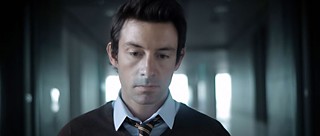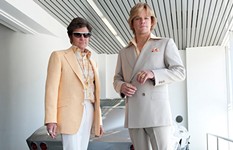Swimming 'Upstream'
Shane Carruth on pigs, money, and being a control freak
By Patrick Courtney, Fri., April 19, 2013
Shane Carruth is nothing if not ambitious.
It'd be impressive enough that the former engineer turned filmmaker took home the Grand Jury Prize at Sundance in 2004 for his debut feature, the sci-fi/time-travel/ultra-low-budget Primer, which he wrote, directed, edited, scored, and starred in. But for his follow-up, Upstream Color, Carruth went one step further and took on the role of distributor as well, effectively taking over some portion of every step of production.
We sat down with Carruth when he was in town for South by Southwest to talk about his latest, which follows two characters as they "rebuild their narrative" in a haunting life cycle that includes pigs, orchid harvesting, and mysterious worms. Complex? Maybe. But when it's coming from someone whom Steven Soderbergh once described as "the illegitimate offspring of David Lynch and James Cameron," you should expect nothing less.
Austin Chronicle: First thing – why pigs?
Shane Carruth: It didn't start with the pig. It was a continuation of a whole thought process. The film ... has a real exploration on its mind about stripping down people's personal narratives and where those come from and the feeling of being affected at a distance. I knew I was going to have these characters and I would strip them, and they would have to rebuild their narrative. They would wake up in some moment and have to atone for what it looks like they must have done, and so they would come to the conclusion that "Oh, I'm this type of person" and they would try to follow through on that, but it would be somehow wrong, and the tension and hopefully romance derives from that sort of ... having everything burned to the ground. That's what I was trying to get to, to play with. Getting there is where the mechanics of this weird pig-worm-orchid life cycle come from.
And so then if you're asking about the pigs at that point, it's about the life cycle. This thing had to be set up in a way that, in my head, met a few criteria. ... It needs to feel relatively permanent, like it's been here and going on for as long as we've been going on. So, for me that means it's embedded somehow in nature; it's part of nature already. It's got to be cyclical; it's got to feel like it could just keep going. And it can't be conspiratorial. The thief and the worm and the sampler and the pigs and then the orchid harvesters and the orchids ... they all have found these tricks in nature that they're just continuing to perform without necessarily knowing that the other one exists. There's a certain balance to that that feels appropriate. And I needed to set all that up.
So then back to your question of why pigs, basically I've got to have some presence that is circling around this storm that our characters are central in – or stuck inside. And so, you know, I've got to have transference, so the physiology of a pig is very close to ours – we transfer a lot of diseases across. I guess there's three things. The next one would be that there's a lot of stuff in our culture already where pigs are an analog for people. Like Christ casting demons into our pigs, or Orwell using pigs in Animal Farm, or any other number of things. And the third thing is that they're ... the exact opposite of what you would want to be connected to. Like, you know, they're not beautiful; there's nothing about them that's elegant. They're just bits of meat that are sitting there doing nothing but eating all day. And so the idea that, you know, our fates are being aligned out in the world with this, these weird bits of livestock just, I don't know ... there's something that's just appropriate about that, I think.
AC: There seem to be two competing narratives with the production of the film. On the one hand, you've got this sort of "Shane is wearing all the hats," and this singular vision you're trying to get out. On the other hand, everyone has been talking about how David [Lowery, Carruth's co-editor] gets brought in midway through the process of editing, and you've said that he saved your life. How do you reconcile those two different things in your head? Do you think there's a tension there?
SC: I just hope that everybody is taking with a grain of salt that .... You know, it is true that I wrote all the music, it is true that I wrote and directed it, it is true that I am the cinematographer. I set up almost every light or lighting environment. Those things are true. But it's obviously not true that I did everything. David is a great example of that. I've not had any kind of real collaboration before this, and I wasn't seeking it out ... because, uh, I'm a crazy person. I really thought that we would be editing in conjunction with shooting, and just the technical details involved with that were time-consuming. But I was losing sleep. And I had a bit of it edited that sort of represented what I needed it to be, but I was just slipping. So I asked him if he would help out, not really knowing too much about what he'd done, just knowing that he'd done a lot of editing. And I think we just really hit it off.
The thing that I really enjoyed is that I felt like we were having conversations before we were making editing decisions, and that was really important to me, especially with a film like this. Because nothing about it plays by numbers so we've got to be on the same page before we start getting into ... the mechanics of it. But anyway, so we talked a lot, and I remember the first few scenes he just took a pass at and it was just .... Talking to him the other day, my memory was that I almost cried when I saw it, because it was just like "I can't believe this guy just saved my life. This is actually going to work." His memory is that I just smiled really big. So, who knows. But it was great, and then I quickly became confident in him – not that he needed to prove anything because he's obviously a wonderful editor and director and writer in his own right.
AC: But in the relationship, you mean.
SC: Exactly, yeah. And then ... it really did become truly collaborative where his ideas were being introduced and he was, you know, keying off of the story and then I was keying off of what he thought of the story, and so it really did take on true collaboration. And I'd say that happened with Tom Walker also, the production designer.
AC: Right.
SC: And again the way I would describe how that worked is that we would have long conversations. Like there was a real understanding. And I think that's maybe what I'm taking away from this. It's like, if we can internalize this story and all get on the same page about exactly what it's trying to do, then there is room to let these things happen and be collaborative. Because my job is not to be a control ... well, I am a control freak. But my job is not to be a control freak just for the fun of it. It's to be a control freak so that I make sure that every element that is in a film is pointing the same direction. That it's all unified. That we're exploring things thematically that are true. Or everything is true. Like, for example, if a bigger movie or a Hollywood movie or whatever has a writer, and then a rewriter, and then a rewriter ... as an audience member I don't know who to point to when something happens onscreen that is challenging to me. And I want to be challenged, and I want to do the work of figuring out "Well, why did that happen there?" but if I know that there's five writers, more times than not I'll just be like, "Eh, it's probably just part of some draft, and they left it in." So that's a small example of why, you know, all these things need to be pointing the same direction. So if I can have conversations like I've had with Tom and David, and we can all have the confidence that we're pointing in the same direction, then I think there is some room. What I really want is just ... the machinery of filmmaking. Like, you know, because 90 percent of my time is spent doing things that aren't storytelling. They are installing drivers and bullshit. So if I can get that pushed aside then I think ... yeah, that would be ideal.
AC: Let's talk a bit about distribution. You talk about 90 percent of your time and not wanting to do bullshit, but that's a huge role, right? You've talked about how important it was to you with this film, and part of it – as I understand it – is resolving some issues you'd had with Primer, that you felt like you could have done better. What were some of your goals in doing your own distribution given that it does take time away from, as you say, developing the story?
SC: It is definitely a compromise. But at this point – and I don't know when this came to be true for me exactly, but it happened sometime in the last eight months – I really do see this whole contextualizing situation as ... this really is storytelling. Inasmuch as anything is. Because when you're dealing with narrative, you're dealing with the half that's the exploration or, you know, the subtextual thesis of it, which could probably be broken down into something very dry and boring. And it would still be just as true in exploration, but no one would want to read it or listen to it, and no one would blame them. So if you marry it with a narrative that's compelling moment by moment, hopefully, for the audience, and it's done in such a way that they are fused together with some balance and it's a good thing, then that's storytelling. So in the same way, providing the audience the information, or showing them how to meet the project or how the film will meet them, that's storytelling as well. You're conveying a lot of information, and you're managing expectations, which is, honestly ... it's a gross corporate phrase, but that's exactly what storytelling is. So anyway, I wouldn't be able to give that up now. ... That's just, I can't ever give that up.
AC: But if you continue to move in that direction, and you say "I can't imagine giving that up," do you feel like at some point you have a sustainability problem?
SC: Yes.
AC: Do you think it's going to be hard to maintain the level of control and exactitude that you've exercised?
SC: I think the answer is money. I really do. Because everything with this distribution ... I've learned a lot, and I'm constantly having conversations about what about this is repeatable. Because some of it isn't. In fact I'd say, well, maybe half of it isn't. But some of it is. And so honestly, a lot of the work that I do and Casey [Gooden, one of the film's producers] does is ... we are making up for the fact that we didn't get a ton of money for this. And we're having to be as crafty and scrappy as we can.
If we can solve that bit, and if we can just make higher level decisions and pay for things to be done ... I mean the other week, you know, I'm running around trying to get our ... we've had a Blu-ray issue, so I'm like running through Blu-ray codecs and all this stuff trying to solve that, and so is Casey. So we're dealing with technical things where if we just had the money to throw at a place, they would just get solved. So it boils down to money, basically. That would get rid of 90 percent of the workload, and then the other 10 percent, to be honest ... there's just nothing wrong with that. It's just fun. It's what you would want as a filmmaker, I think.
AC: One of the things that you've talked about recently is not wanting to discuss tech details – that it's not something you want to get in to and that some of that stems from feeling like you were pigeonholed with Primer, right? That you were always asked about the budget or about shooting on film and things of this nature.
SC: Yeah. But I wouldn't use the word "pigeonholed" because I know that I basically used that in a big way ...
AC: That it was helpful?
SC: Oh yeah. I mean that's the thing. All the things that I used and that I made a choice to play up ... I'm now having to fight a bit. Just a bit. I mean it's the luckiest position in the world to be in. But you know people, more times than not, if they have something to say that's nice about Primer, they say, "Oh that's a good film, especially considering how little it cost." And it's that last part of it, that's the naggy bit. Primer is Primer, and I'm a little bit insecure about it, to be honest.
AC: About Primer?
SC: Yeah, because I mean, it was my first film and I see the rough edges and all of that. This one, Upstream, I see it completely differently. I could not be more proud of this. And the last thing I ever want to hear ... Look, if someone doesn't like it, then they don't like it. But I don't want to hear "given that it cost this or that it was shot on that." I just don't want it reduced to these sort of indie trope elements and that's all.
AC: What's next? Are you going to return to A Topiary? Are you still interested in pursuing that project? Do you have something totally different and new in mind?
SC: I'm writing something now that I'm very passionate about. It's called The Modern Ocean, and it doesn't have any weird genre elements at all or whatever. It's basically just a tragic romance among shipping routes in the world, and it's a continuation of a lot of the visual and emotional language from Upstream Color; it's just sort of amplifying that in a big way. And the way that it moves. It just has to do with a really solid architecture that you can explore lyrically, and I think that in practice it just winds up being ... like with editing I'm less and less interested in chronology and more and more interested in syncing up moments that are revelatory emotionally.
Upstream Color opens in Austin Friday, April 19. Read our review of 'Upstream Color' and find showtimes in our Film Listings.










